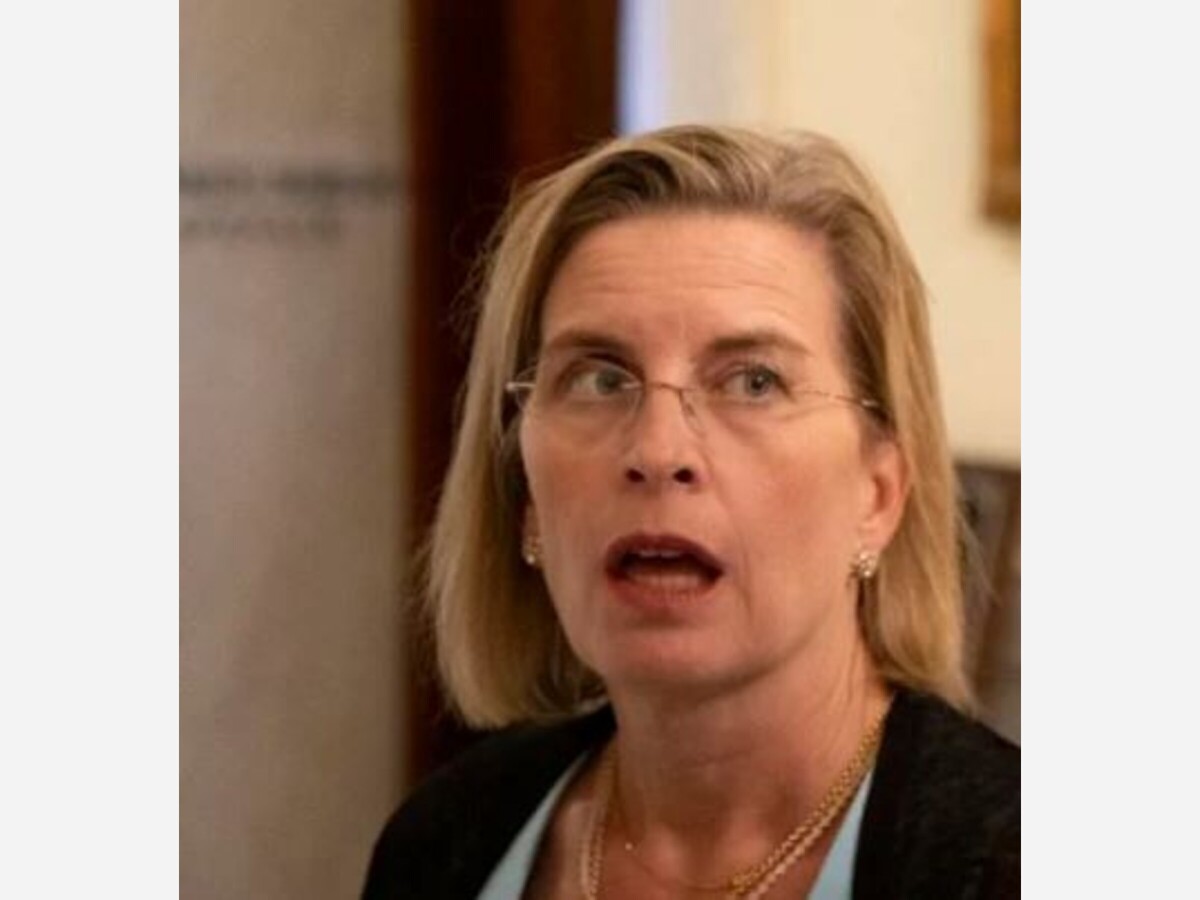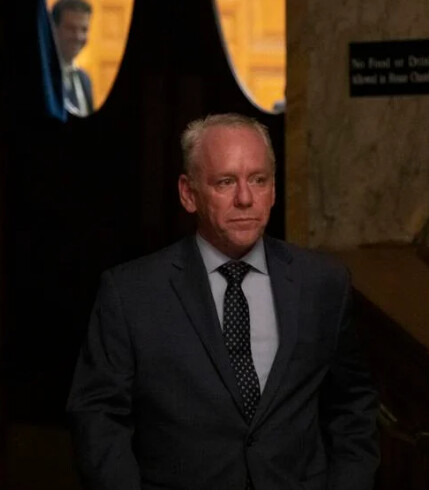Image

Rep. Marjorie Decker reacts to House Majority Leader Michael Moran on Jan. 31. After the end of the session, Senate President Karen Spilka went to a conference in Kentucky.
Lawmakers met for 22 hours on the final day of formal sessions without agreeing on some of the most impactful bills of the term. A week later, little has changed among Beacon Hill Democrats.
House and Senate negotiators are "very, very close" to a deal on maternal health legislation, according to one top negotiator, but there's been virtually no movement on the range of other unfinished measures since the Legislature adjourned its final formal session hours after sunrise on Aug. 1.
Legislative leaders continue to express optimism about their ability to push stalled proposals across the finish line in the months ahead without providing any evidence of progress. While Gov. Maura Healey has been active with bill signings and a handful of other events, the State House itself has fallen into a lull over the past week, suggesting many lawmakers are in their districts, or beyond.
The branches each met for less than an hour on Monday and Thursday before adjourning for the week.
The News Service on Thursday contacted all 13 representatives and senators leading conference committee talks on bills that passed both branches but have yet to emerge in a compromise fashion, as well as House Speaker Ron Mariano and Senate President Karen Spilka.
Seven of the head conferees weighed in, some offering as little as a single sentence suggesting that work is ongoing. Reps. Aaron Michlewitz, Michael Moran, Adrian Madaro and John Lawn and Sens. Brendan Crighton and Cindy Friedman either did not reply to the News Service or, through aides, declined to speak.
A Mariano aide said the speaker was unavailable. A spokesperson for Spilka, who traveled to Kentucky on Monday for a National Conference of State Legislatures conference and is returning Thursday, did not make her available for an interview and instead provided a statement that said "work has not ended since the July 31 deadline."
"Many Senate members are engaged in productive discussions on legislation in their respective conference committees and on other matters," the spokesperson said. "The Senate remains optimistic that legislation will be resolved and passed in the coming weeks and months."
Conference committee members have voted to close their deliberations, so there's no way to know how often or rarely they talk, and they in general decline to discuss the areas that have led Democrats to a series of impasses.
Ongoing disagreement on topics that both branches wanted to address leaves Massachusetts without any new hospital safeguards in place while Steward Health Care moves to close two hospitals and sell five others, and without updated laws to deal with the opioid epidemic, long-term care oversight and prescription drug prices.
The biggest shift in outlook so far appears to be on legislation designed to improve maternal health outcomes. After voicing frustration about the Senate's pace of work early in the afternoon on the final day of sessions, lead House negotiator Rep. Marjorie Decker said Thursday the conference committee has "met multiple times."
"We have been on the phone, we've had multiple conversations every day including last Thursday," Decker, a Cambridge Democrat, said. "We are very, very close."
Asked if an accord could emerge for final passage during an informal session this month, Decker replied, "Absolutely."
Healey has been pushing legislative leaders to call lawmakers back for a special formal session to complete their work on an economic development bond bill, whose borrowing authorizations need a roll call vote to pass.
Mariano and Spilka both signaled they are open to that unusual step if and when the conference committee reaches a deal, without attaching any specific deadline or timeframe. Negotiators themselves are tight-lipped about the outlook, too.
In a statement Thursday, economic development bond bill negotiator Sen. Barry Finegold said, "We remain hopeful that we can get an economic development deal done this session." He did not offer any additional details.
None of the unfinished conference committees seemed closer to completion when the final gavel rang out last week than the panel negotiating over awarding more liquor licenses to Boston. The House and Senate leaders both said at the time they thought a deal was close and should be able to sail through in an informal session.
That remains the status quo a week later.
"There are no major disagreements and I hope we will be able to get T's crossed and I's dotted soon," said lead Senate conferee Will Brownsberger.
Healey also wants the Legislature to find a path forward on changing how the state sites and permits new clean energy infrastructure, which Healey said would "move our climate technology forward and move forward our push for renewables."
The Healey administration helped craft the siting and permitting reforms that form the foundation of the bill, and the House and Senate each added on various other priorities that now divide negotiators.
"I think there is agreement there about what needs to happen with permitting and siting. It's very, very important we act on that," Healey told reporters Thursday after an unrelated event.
Asked if she would advocate for a "skinny bill" limited just to the permitting and siting changes, Healey replied, "No, there's more there" and spoke about making it easier for the state and third parties to procure energy.
"Ratepayers need to see their electricity bills go down. We need to do this work to decarbonize our housing and transportation and manufacturing sectors and to lower greenhouse gas emissions," Healey said. "This is absolutely essential."
Legislative talks on that topic failed to produce an accord last week, drawing criticism from climate activists desperate to see state action.
Rep. Jeff Roy, the lead House negotiator, said Thursday he thinks the "best course of action" is to narrow the bill only to siting and permitting reforms and to leave other House- and Senate-backed ideas on the table. Some Republicans voted against the underlying bill, and objection from any one of them could stall a compromise from advancing during an informal session.
"In terms of our ability to do anything beyond siting and permitting, it's difficult to do anything in informal because one person can stand up and object. But I don't think there would be any objection if we were to do the siting and permitting provisions only," Roy said. He added, "I would have loved for us to get together to do some of the things that were in both of the bills, but given that the House bill had all Republicans voting against it, we can't take a chance and put additional stuff in beyond siting and permitting."
His counterpart, Sen. Michael Barrett, said the Senate continues to hope to tackle both siting and permitting reform as well as some more consumer-oriented changes, like ratepayer relief, at once.
"We're looking to provide some financial relief on the other side of the ledger -- if you're going to skyrocket my electric bill, give me some relief on my gas bill. Let's have a trade," Barrett said.

Above, Rep. Jeff Roy answers reporter question on Aug. 1.
Roy and Barrett each told the News Service on Thursday they have not spoken to one another since last week. But they both downplayed any significance behind that gap.
"We had a disagreement on just how far we would go with each of our bills. The fact that we haven't spoken in a few days doesn't mean anything. I'm sure we will be in touch," Roy said. "It's just a matter of getting some sense as to whether or not the Senate is willing to do this informally. We need their agreement to get this done. A few days of down time should not be read as any impasse."
Barrett said he believes "things have changed for the better" over the past week.
"Inevitably, a dramatic moment like the 31st of July clarifies the positions of all parties. I think we see each other more clearly now," he said. "I believe we're going to find a reconciliation here, and I think the governor's going to lead the way. She is going to help us craft a win-win."
Talks also have yet to make any real breakthrough on legislation to reform the long-term care sector with new safeguards and oversights, some inspired by the COVID-19 pandemic.
Rep. Thomas Stanley, the lead House conferee on the topic, said correspondence between negotiators has continued but added that he has not received a "counterproposal" since sending one to the Senate side around midnight on the last night of formal sessions.
"It's understandable that people plan a few days off after the end of formal sessions, whether it's staff or members with their families. That's understood, that it's going to be difficult to get up and going right away. But we're ready," Stanley said.
Stanley added that he thinks the measure could secure final passage during an informal session once the conference committee produces a deal, which he hopes will happen "as fast as possible."
"I think the differences are very resolvable. It's not insurmountable," he said. "It's just a matter of putting the time and attention to it."
An aide to Senate Ways and Means Committee Chair Michael Rodrigues, who is leading Senate talks on long-term care and on a federal funds competition bill that's been on ice for months, said the Westport Democrat "has been steadfast in working with conferees to come up with consensus agreements."
"There has been no shortage of productive dialogue and substantive discussions relative to these respective Committees," Rodrigues's spokesperson said. "He remains optimistic and hopeful, and the work will continue until the remaining differences are resolved, agreements are reached, and this important legislation is passed in the near future."
[Sam Drysdale contributed reporting.]